Related Research Articles

Existentialism is a form of philosophical inquiry that explores the issue of human existence. Existentialist philosophers explore questions related to the meaning, purpose, and value of human existence. Common concepts in existentialist thought include existential crisis, dread, and anxiety in the face of an absurd world and free will, as well as authenticity, courage, and virtue.
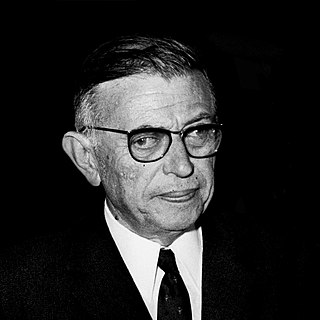
Jean-Paul Charles Aymard Sartre was a French philosopher, playwright, novelist, screenwriter, political activist, biographer, and literary critic, considered a leading figure in 20th-century French philosophy and Marxism. Sartre was one of the key figures in the philosophy of existentialism. His work has influenced sociology, critical theory, post-colonial theory, and literary studies. He was awarded the 1964 Nobel Prize in Literature despite attempting to refuse it, saying that he always declined official honors and that "a writer should not allow himself to be turned into an institution."

The Situationist International (SI) was an international organization of social revolutionaries made up of avant-garde artists, intellectuals, and political theorists. It was prominent in Europe from its formation in 1957 to its dissolution in 1972. The intellectual foundations of the Situationist International were derived primarily from libertarian Marxism and the avant-garde art movements of the early 20th century, particularly Dada and Surrealism. Overall, situationist theory represented an attempt to synthesize this diverse field of theoretical disciplines into a modern and comprehensive critique of mid-20th century advanced capitalism.
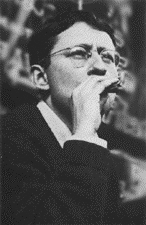
Guy-Ernest Debord was a French Marxist theorist, philosopher, filmmaker, critic of work, member of the Letterist International, founder of a Letterist faction, and founding member of the Situationist International. He was also briefly a member of Socialisme ou Barbarie.
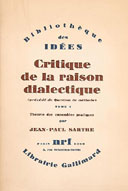
Critique of Dialectical Reason is a 1960 book by the philosopher Jean-Paul Sartre, in which the author further develops the existentialist Marxism he first expounded in his essay Search for a Method (1957). Critique of Dialectical Reason and Search for a Method were written as a common manuscript, with Sartre intending the former to logically precede the latter. Critique of Dialectical Reason was Sartre's second large-scale philosophical treatise, Being and Nothingness (1943) having been the first. The book has been seen by some as an abandonment of Sartre's original existentialism, while others have seen it as a continuation and elaboration of his earlier work. It was translated into English by Alan Sheridan-Smith.
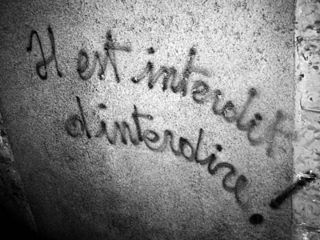
The Letterist International (LI) was a Paris-based collective of radical artists and cultural theorists between 1952 and 1957. It was created by Guy Debord and Gil J. Wolman rejoined by Jean-Louis Brau and Serge Berna as a schism from Isidore Isou's Lettrist group. The group went on to join others in forming the Situationist International, taking some key techniques and ideas with it.

Psychogeography is the exploration of urban environments that emphasizes interpersonal connections to places and arbitrary routes. It was developed by members of the Letterist International and Situationist International, which were revolutionary groups influenced by Marxist and anarchist theory as well as the attitudes and methods of Dadaists and Surrealists.
Lettrism is a French avant-garde movement, established in Paris in the mid-1940s by Romanian immigrant Isidore Isou. In a body of work totaling hundreds of volumes, Isou and the Lettrists have applied their theories to all areas of art and culture, most notably in poetry, film, painting and political theory. The movement has its theoretical roots in Dada and Surrealism. Isou viewed his fellow countryman Tristan Tzara as the greatest creator and rightful leader of the Dada movement, and dismissed most of the others as plagiarists and falsifiers. Among the Surrealists, André Breton was a significant influence, but Isou was dissatisfied by what he saw as the stagnation and theoretical bankruptcy of the movement as it stood in the 1940s.

Raoul Vaneigem is a Belgian writer known for his 1967 book The Revolution of Everyday Life.

The dérive is an unplanned journey through a landscape, usually urban, in which participants stop focusing on their everyday relations to their social environment. Developed by members of the Letterist International, it was first publicly theorized in Guy Debord's "Theory of the Dérive" (1956). Debord defines the dérive as "a mode of experimental behaviour linked to the conditions of urban society: a technique of rapid passage through varied ambiances."
In existentialism, bad faith is the psychological phenomenon whereby individuals act inauthentically, by yielding to the external pressures of society to adopt false values and disown their innate freedom as sentient human beings. Bad faith also derives from the related concepts of self-deception and ressentiment.
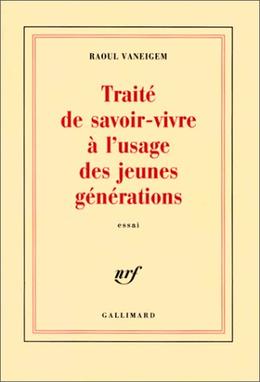
The Revolution of Everyday Life is a 1967 book by Raoul Vaneigem, Belgian author and onetime member of the Situationist International (1961–1970). The original title literally translates as, Treatise on How To Live for the Younger Generations. John Fullerton and Paul Sieveking chose the title under which the work appears in English.

Michèle Bernstein is a French novelist and critic, most often remembered as a member of the Situationist International from its foundation in 1957 until 1967, and as the first wife of its most prominent member, Guy Debord.
Gil Joseph Wolman was a French artist. His work encompassed painting, poetry and film-making. He was a member of Isidore Isou's avant garde Letterist movement in the early 1950s, then becoming a central figure in the Letterist International, the group which would subsequently develop into the Situationist International.

The spectacle is a central notion in the Situationist theory, developed by Guy Debord in his 1967 book The Society of the Spectacle. In the general sense, the spectacle refers to "the autocratic reign of the market economy which had acceded to an irresponsible sovereignty, and the totality of new techniques of government which accompanied this reign." It also exists in a more limited sense, where spectacle means the mass media, which are "its most glaring superficial manifestation."
Donald Nicholson-Smith is a translator and freelance editor, interested in literature, art, psychoanalysis, social criticism, theory, history, crime fiction, and cinema. Born in Manchester, England, he was an early translator of Situationist material into English. He joined the English section of the Situationist International in 1965 and was expelled in December 1967. He lives in New York City.

Report on the Construction of Situations is the founding Manifesto of the Situationist International revolutionary organization. The pamphlet was published by Guy Debord in June 1957, and the following month the organization was founded in Cosio d'Arroscia, Italy.
This is a list of articles in continental philosophy.
The Situationist International's interpretation of the Paris Commune of 1871 was influenced by their collaboration with Henri Lefebvre with whom they had been in contact since the late 1950s. Lefebvre’s writings on revolutionary romanticism and everyday life were important influences on the early SI. In the early 1960s Guy Debord, Attila Kotányi and Raoul Vaneigem agreed to assist Lefebvre in his preparations for a book on the Commune. The results of their brainstorming sessions were written down in 1962 by the SI in their “Theses on the Paris Commune.” After Lefebvre published his respective notes on their collaboration, in a 1962 piece entitled “La Signification de la Commune,” the two parties had a falling out as the SI ostensibly disagreed with the journal in which he published. Both the SI and Lefebvre published extensively on the feud in the following decade.
Louis Janover is a French essayist, translator and publisher. He is a theorist of council communism.
References
- ↑ Miller, Tyrus (2006). "Situation and event: The destinations of sense". In Franko, Mark (ed.). Ritual and Event: Interdisciplinary Perspectives. Routledge. p. 80. ISBN 9781134003686.
- ↑ Sartre, Jean-Paul (1992). Being and Nothingness: An Essay in Phenomenological Ontology. Simon and Schuster. p. 621. ISBN 978-0-671-86780-5.
- ↑ Jean-Paul Sartre, Lloyd Alexander (1969), The wall (Intimacy) and other stories, p. 109
- ↑ Stuart Zane Charmé (1993) Vulgarity and Authenticity: Dimensions of Otherness in the World of Jean-Paul Sartre, pp.184-5
- ↑ Sartre, Jean-Paul (1976). Sartre on Theater. p. 4.
- ↑ Hussey, Andrew (2002) The game of war: the life and death of Guy Debord p.105
- ↑ Touza, L. Sebastian (2008) Antipedagogies for liberation politics, consensual democracy and post-intellectual interventions p.171
- ↑ Kaufmann, Vincent (2011) Guy Debord Archived 2011-07-23 at archive.today for the Institut français . English translation Guy Debord by Martin Richet
- ↑ Letterist International, January 1954 in La Carte d’après Nature. Republished in Potlatch n.5
- ↑ Sheringham, Michael (2006) Everyday life: theories and practices from surrealism to the present, p.162
- ↑ Claire Gilman Asger Jorn 's Avant-Garde Archives, in Guy Debord and the Situationist International, p.201 and note 18 on p.210
- ↑ Peter Wollen Bitter Victory: The Art and Politics of the Situationist International, published in Elisabeth Sussman (1989) On the passage of a few people through a rather brief moment in Time: The Situationist International 1957-1972